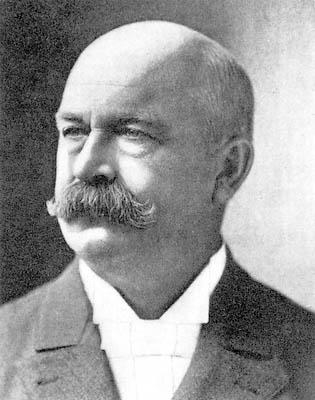 |
| Colonel Francis W. Parker Unknown author [Public domain] via Wikimedia |
October 9th marks the birthday of one of the great figures in the history of American education: Colonel Francis Wayland Parker. Born in 1837, Colonel Parker, a Civil War veteran who took a bullet in the neck as he fought for freedom, equality and democracy. He believed that America could flourish only if our public schools were thriving institutions capable of educating students with the skills and character to be active citizens in our democracy.
Colonel Parker knew that advocating for public education is a patriotic and political act.
Parker worked tirelessly throughout his career to improve the lives of children by transforming how teachers taught and how schools operated. In his time, Colonel Parker was known as "The Children's Crusader" and "The Teacher of Teachers." He was a champion for early childhood development and the development of the teaching profession. Colonel Parker feared that our democracy would decay because of the failures of schools to be exciting and dynamic communities of learning and growth. He hated that children were wasting their time and suffering from the deadening effects of being in underfunded school systems full of untrained teachers who intimidated children to recite by rote from dull textbooks. And he despised that the teachers themselves were forced to teach to the test and fill the school day with lectures, rigidity and examinations.
Parker spoke directly to school children about the value of hard work and taking responsibility for their own actions.
As a teacher, principal and superintendent, Parker worked to change the face of education in Quincy, Massachusetts as well as in Boston and Chicago, where, in 1883, he became the principal of the Cook County Normal School. Guided by high democratic ideals and a firm commitment to excellence, Colonel Parker believed that America needed citizens educated through engaging experiences in free public schools. American schools, according to Parker, must inspire and educate students to have the skills and develop the self-confidence to think critically, listen empathically and collaborate imaginatively on behalf of the greater good of the nation and its requirements for freedom, responsibility and equality.
Francis Parker knew that children needed to have inspiring relationships with their teachers in order learn and grow. He knew that teachers needed to have small class sizes in order to know and nurture their students fully. He created the nation's first parent-teacher association for he knew that students benefit enormously when parents and teachers have a strong partnership with each other. And he knew that schools and students thrive when teachers provide students with real experiences of inquiry through conversation and hands-on involvement with the world, and not by engulfing students in a culture of testing.
This 19th Century educator knew what is still true today. Young people and their teachers are full of desire to learn and achieve. Students, teachers and parents thrive when they feel respected as human beings. Educators act thoughtfully as role models and mentors when they are wholeheartedly supported in the noble pursuit of teaching children to read and write, count and think, create and grow in character and confidence. And that none of this is possible unless everyday citizens and their elected political representatives make a deep and lasting moral commitment to assure that public education becomes a proud top national priority with all of the necessary financial and political resources to do so.
More than one hundred years ago, Colonel Francis Parker wrote these words:
"Fighting for four years in the Civil War, as best I could, for the preservation of the democratic ideal, a teacher of little children for nearly forty years, I believe four things, as I believe in God--that democracy is the one hope of the world; that democracy without efficient common schools is impossible; that every school in the land should be made a home and a heaven for children; that when the ideal of the public school is realized, the blood shed by the blessed martyrs for freedom will not have been shed in vain."
This strong educator spoke to children and to adults about the responsibility we each hold for the success of our schools. "The children of today are in our hands. Whatever we do for them will determine the future. Our lack of faith in this direction is the greatest infidelity."
Page created on 7/24/2012 12:00:00 AM
Last edited 8/23/2024 2:43:04 PM
One hundred and eighty students were enrolled when Francis W. Parker School opened in 1901. They came to a new school, with fresh ideas. Colonel Francis W. Parker, influenced by the educational theories of John Dewey, envisioned a school that held the child at its very center. His fundamental belief was that learning could be fun and proved his point, not by theories on child psychology, but with actual classroom demonstrations. Colonel Parker believed that education included the complete development of an individual: mental, physical, and moral. Through the educational journey, students would develop in to lifelong learners and active, democratic citizens.
Colonel Parker believed that these great citizens must use their knowledge to improve the community “to make things better, more fair and pure. Parker students would graduate, not only with vast knowledge, but also with heart and soul."
For 100 years we have stayed true to the core philosophy as set forth by our original founders. We have been guided by our motto, which puts into practice the ideal that lies at the heart of a Parker education.”
"Everything to help and nothing to hinder."
